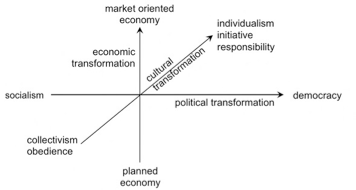Sign up for FlowVella
Sign up with FacebookAlready have an account? Sign in now
By registering you are agreeing to our
Terms of Service
Loading Flow

Transformation in Central and Eastern Europe
The transformation in Central and Eastern Europe is an important demonstration of the ‘value of values’, including the effects over generations.
Next to all other aspects, the fall of socialism in Central and Eastern Europe was quite a culture shock, requiring a major change in values in all 28 states at the time. The Western assistance for the transformation process initially focused on the political and economic aspects of transformation. These aspects are indicated by the horizontal and vertical axes in the model on the left, including some key words to indicate the nature of the change.
Although both the political and the economic system imply culture (ways of thinking and acting in general but also for instance shareholder versus Rhineland model), these cultural aspects were hardly discussed. The transformation process was in Western eyes a question of change management without culture. Only
after several years all parties involved had to recognised that the process should have started with rebuilding civil society and trust in institutions, with culture in short (the third axis). The cultural aspects clarify why the transformation process is as yet unfinished.
In the earlier paragraph on values and time I mentioned that values are determined in pre-adult years and that major changes require several generations. This would for instance imply that the countries of Central Europe, which became a member of the EU a decade ago, would only be EU members in the mental sense from 2070 onwards. Another example of the consequences of this theory is that assimilation (in contrast to integration) of foreigners in a society takes ate least three generation (and in Europe even four).
Some research indicates that this is indeed the case, even if major economic and/or social change occurs.
